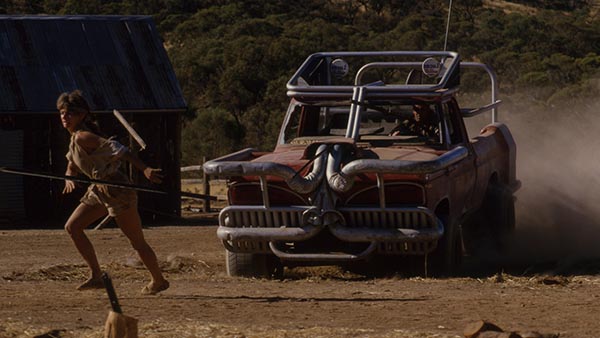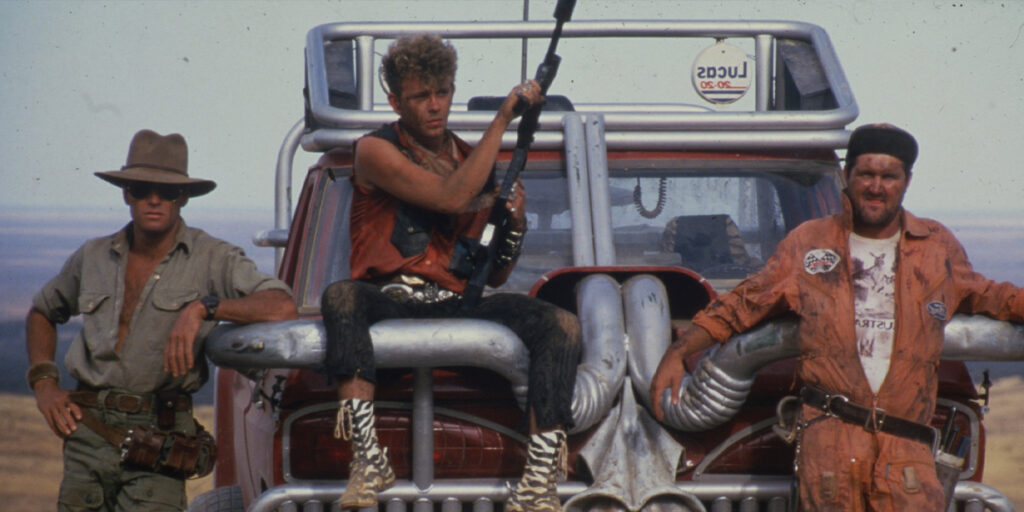Fair Game provokes and entertains, as well as alluding to Grindhouse classics, thanks to its jolty performances and thrilling sequences.
Although he may be pretty annoying to hear because of his hyper attitude and self-importance (as Fiona Apple described him, excruciating), Quentin Tarantino has shined a light on Grindhouse, B-movie, and exploitation cinema to modern audiences, including me. I wouldn’t have learned about that type of filmmaking had it not been for Death Proof, which I believe is Tarantino’s worst feature by a mile (without counting Four Rooms), and Robert Rodriguez’s Planet Terror. Instead, it paved the way for today’s generation to explore those features. I’m always excited to see other people’s reactions to those types of films. Ever since I first saw Tarantino and Rodriguez’s Grindhouse, I have watched plenty of films from that selection of movies, both good (Daughters of Darkness, Messiah of Evil, The Beyond) and bad (Bloodsucking Freaks, The Crawlers). Even if they might be on either territory (god or bad), most of them are interesting in their own way as they explore their intriguing concepts while almost being at the tipping point of provoking the viewer/audience.
One of the films that inspired Tarantino to make Death Proof is the 1986 Ozploitation picture Fair Game, directed by Mario Andreacchio. Fair Game revolves around a young woman named Jessica, played by Cassandra Delaney, who had a quick role in Paul Ziller’s weirdly entertaining Pledge Night. She runs a wildlife sanctuary in the Australian outback, where she takes care of several animals. Most of them are not seen; the only ones that we see are a horse, a lounge of lizards, and her dog. Things take a left turn instantly once Jessica meets a trio of kangaroo hunters. They are harassing and talking back at her – taking photos as she walks back to her car. Jessica senses that things are going to get worse. And they immediately do. After killing her animals in the sanctuary, the trio chases her through the outback. That’s their version of “fun”. However, Jessica isn’t going to let her guard down. Will she survive? Yes, of course, but through difficult means and a thrilling third act.

Like most grindhouse and exploitation films, it is tricky to recommend Fair Game to people, since it deals with hard topics and themes. Fair Game feels like it was derived from films such as I Spit on Your Grave and Razorback because of their revenge-thriller genre trappings. Although it is not exploitative to the same degree as a Necromantik or Ms. 45 (and even the aforementioned I Spit in Your Grave), the film contains several scenes to deserve such a title. It can even be considered the “poster child” of the Ozploitation scene – one of the primary examples of Australian pictures catered for audiences with “extreme” tastes. George Miller’s Mad Max paved the way for the violent and dusty atmosphere, but Fair Game presents it in a more drive-in appropriate format. And by all means and purposes, it fits the bill perfectly in all its facets (directing, editing, among others).
There are occasions in which it feels too much like a B-movie. However, in my book, those are its most engaging features, from its exaggeratedly wicked villain performances to its 80s-centered synth score. Of course, one might question the reasoning behind its exploitative nature, and its scenes of sheer harassment, because of its full-frontal depiction of abuse and coercion. This is best represented in the scene where Jessica is tied up, almost entirely naked, in front of the villains’ car. But that questioning may apply to most of the films in the subgenre. Most of the movies in this subgenre are ill-mannered. Yet, it all depends on two things: how the director and writer depict its central concepts, and what their intentions are. In the case of Fair Game, its concept of juxtaposing animal hunters with actual beats from the wild to portray sexism and hierarchies of power dynamics works thanks to its Australian setting and atmosphere. In an interview, director Andreacchio said he had fond memories of his times doing Fair Game and wanted to treat it like “comic book violence” or a “comic book study of violence”.
I could say that there is a glimpse of that comic book evaluation of violence because the depiction of brutality by the antagonists is quite cartoonish. There is one exception, however, in Peter Ford’s character, Sunny. He’s the only antagonist representing violence and sexism’s true evils. The other two members of the trio are too cartoonish, to the point where it gets a bit annoying. Nevertheless, the director saying that it is “comic book violence” is a bit troublesome when it comes to the film’s themes. It raises questions about the reasoning behind some sequences, especially the aforementioned “tied to the car” scene. I don’t think that was Andreacchio’s intention to be seen or depicted in that manner, since it is not overly sleazy nor does it showcase total anarchic violence besides that particular scene. The rest consists of patiently crafted scenes that build Fair Game’s tension through exploitation direction.
Fair Game is a ninety-minute mind game that keeps developing into a stronger and more dangerous competition of torture as it transgresses. It may not attract all kinds of audiences, but if you are seeking thrills and a bit of provocation in the manner of Ozploitation, look no further than this picture.
Fair Game opened theatrically in the US on July 8, 2022, before a digital release on July 12. A physical release of the film is planned for August.

